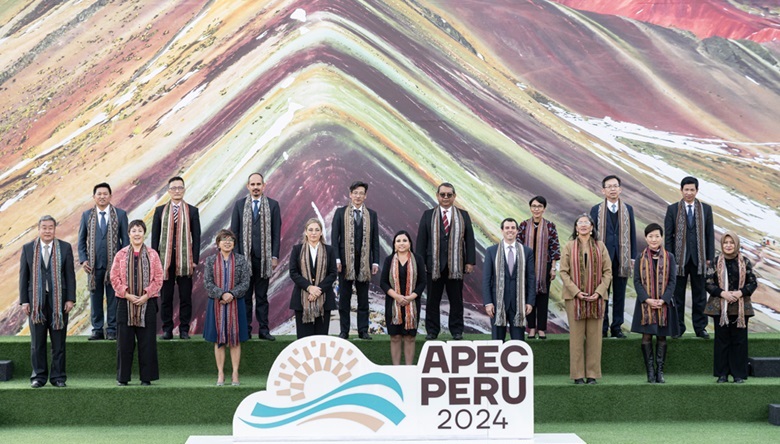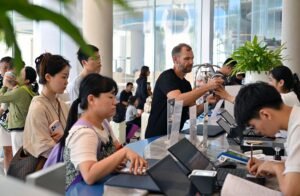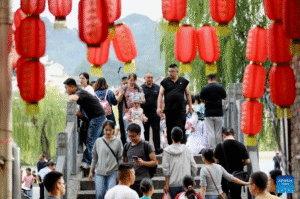21 Asia-Pacific Tourism Ministers commit to work for sustainable tourism development

Travel Biz News —
Tourism ministers from the 21 APEC ( Asia-Pacific Economic Cooperation ) member economies issued a statement following their meeting in Urubamba, Peru on June 9.
The joint statement reflects the outcomes of the APEC Tourism Ministerial Meeting chaired by Peru’s Minister of Trade and Tourism Elizabeth Galdo.
Under the theme of “Innovating Pathways for Sustainable Tourism Growth,” the statement highlights the need for innovative approaches to address current challenges in the tourism sector, emphasizing the benefits of tourism enterprises’ transition into the formal economy which supports the growth of small and medium enterprises and builds resilience.
Ministers also reaffirmed their commitment to building resilient tourism ecosystems that can withstand extreme weather, natural disasters and global health crises, thereby safeguarding livelihoods, preserving cultural heritage and promoting inclusive growth.
Ministers noted Peru’s work towards the development of a platform aimed at promoting cooperation among APEC economies with respect to sustainable tourism development across the Asia-Pacific region.
The statement also highlighted the need to promote sustainable gastronomy, food production, processing and consumption patterns to minimize the environmental footprint of tourism activities in the region.
APEC 12th TOURISM MINISTERS STATEMENT ON “Innovation and Sustainability: Forging the Future of Tourism in the Asia-Pacific Region”
June 9th, 2024
Urubamba, Peru
We, the APEC Tourism Ministers and senior representatives, met at the APEC 12th Tourism Ministerial Meeting (TMM) in Urubamba, Cusco, Peru on 9 June 2024. The meeting was chaired by H.E. Mrs. Elizabeth Galdo Marín, Minister of Trade and Tourism of Peru.
To implement the APEC Putrajaya Vision 2040 to achieve an open, dynamic, resilient and peaceful Asia-Pacific community by 2040 for the prosperity of all our people and future generations, we gathered under the theme of APEC Peru 2024 “Empower. Include. Grow.”, focusing on the following APEC 2024 priorities: trade and investment for inclusive and interconnected growth; innovation and digitalization to promote transition to the formal and global economy and sustainable growth for resilient development.
We congregated under the TMM12 theme of “Innovating Pathways for Sustainable Tourism Growth”, which highlights the need for innovative approaches to address current challenges in the tourism sector. This includes formalizing businesses and fostering sustainability and resilience, in order to realize the full economic potential of all, including MSMEs, women and others with untapped economic potential, such as Indigenous Peoples as appropriate, people with disabilities, and those from remote and rural communities.
We acknowledge the benefits of formalization for the development of the tourism industry, including job creation, enhanced market access, and improved quality service delivery as well as certification of competencies, products and services. We recognize the role innovation, digitalization, and an enabling business environment can play in facilitating the transition of tourism enterprises into the formal economy and supporting the growth of small and medium-sized enterprises in the tourism sector.
We underscore the importance of embracing technological advancements to enhance competitiveness and sustainability. From digital marketing strategies and online booking platforms to advanced payment systems, innovation offers a myriad of opportunities to enhance the efficiency, transparency, and resilience of the tourism sector. By embracing technological advancements, streamlining administrative processes, and fostering a culture of entrepreneurship, we can interconnect and empower tourism businesses, including businesses’ ongoing formalization and help them to access global markets. In harnessing these opportunities, we emphasize the importance of bridging digital divides and promoting inclusive access to advancements in digital technologies. We encourage economies to accelerate digital transformation, making tourism more accessible, and foster ecologically sustainable tourism activities. We recognize that cultural and creative industries can contribute to inclusive growth and job creation and can foster the participation of MSMEs in regional and global markets, including the tourism sector. We also note the ongoing work in APEC to develop these industries and promote MSMEs’ participation. Building on previous work, we are committed to promoting intellectual property rights through policies and programs that advance innovation and creativity.
Emphasizing the importance of fostering resilient growth within the tourism sector, we reaffirm our commitment to enhancing its adaptive capacity, sustainability and inclusivity. The tourism industry is susceptible to various external impacts, including extreme weather, natural disasters and global health emergencies, among others. Therefore, it is imperative that we prioritize resilience-building measures to mitigate and reduce risks and ensure the continued viability of the tourism sector. In this regard, we commit to continue implementing the “Policy Recommendations for Tourism of the Future: Regenerative Tourism”, which prioritizes economic, social, cultural and environmental well-being and the creation of resilient tourism ecosystems. By building resilient tourism ecosystems that can withstand unforeseen challenges, we can safeguard livelihoods, preserve cultural heritage, and promote inclusive growth across the APEC region. We recognize that tourism activities shall actively contribute to supporting conservation and protection of natural resources and biodiversity.
We recognize the potential of sustainable gastronomy and efficient waste management practices in bolstering the sustainability of the tourism sector across the Asia-Pacific region. Gastronomy plays a central role in shaping the travel experience, offering visitors a taste of local culture, tradition, and identity. Noting the importance of encouraging sustainable food production, processing and consumption patterns, we can harness the power of gastronomy in the tourism sector to drive sustainable economic growth, foster food security and nutrition, conserve biodiversity, and promote inclusion. Additionally, by adopting innovative waste management solutions, such as composting, recycling, and organic waste-to-energy technologies, we can minimize the environmental footprint of tourism activities and promote circular economy approaches. Through collaborative efforts and knowledge sharing, we can unlock the full potential of sustainable gastronomy and waste management to create vibrant, resilient, sustainable and inclusive tourism destinations across the Asia-Pacific region.
Committed to advancing gender equality in tourism and adhering to the La Serena Roadmap for Women and Inclusive Growth, and aligning with the Putrajaya Vision 2040, we underscore the importance of women’s inclusion and empowerment in the tourism industry. Women of diverse backgrounds play a vital role in the tourism sector, comprising a significant portion of its workforce. Therefore, we reaffirm our commitment to promoting and achieving gender equality and women’s economic empowerment in tourism through targeted policies, initiatives, and capacity-building programs. By ensuring full and equal access to employment, education, and entrepreneurship opportunities, we can encourage women of diverse backgrounds to overcome the barriers that limit their participation and leadership in the economy and impede gender equality in the tourism sector.
We recognize the importance of youth empowerment in the tourism industry. We encourage economies to continue discussing effective measures to create inclusive and equal employment opportunities, and supporting educational and mentorship programs.
Harnessing the power of innovation and connectivity we endeavor to enhance the accessibility and sustainability of tourism in the APEC region. Connectivity plays a crucial role in facilitating seamless travel experiences, enabling tourists to access destinations efficiently, safely and sustainably. We will continue to implement the APEC Connectivity Blueprint (2015 – 2025). By investing in digital technology, transportation infrastructure, innovative tourism solutions, and optimizing sustainable tourism supply chains, we can enhance the accessibility and sustainability of tourism destinations, reduce travel times and costs, and minimize the environmental impact of tourism activities.
We note work towards the development of a platform, aimed at promoting cooperation among APEC economies with respect to sustainable tourism development across the Asia-Pacific region. This platform may serve as a channel to further facilitate dialogue, share best practices and relevant publicly available information and data, and foster collaboration among APEC economies. We look forward to TWG reporting progress on this platform by the end of this host year.
Commending the achievements of the APEC Tourism Strategic Plan 2020-2024, we thank member economies for their active participation and contribution to its successful implementation. This strategic plan has served as a guiding framework for advancing sustainable tourism development across the Asia-Pacific region, focusing on four priority areas: Digital Transformation, Human Capital Development, Travel Facilitation and Competitiveness, and Sustainable Tourism and Economic Growth. We extend our appreciation to all stakeholders for their dedication and commitment to advancing sustainable tourism development in the Asia-Pacific region.
We express gratitude for the insights shared by Ministers during deliberations on the proposed APEC Tourism Strategic Plan 2025–2029. With a renewed focus on embracing emerging trends and addressing current challenges, we express our confidence that the new strategic plan will chart a visionary course of action for the tourism sector. We anticipate that the plan will help drive sustainable and inclusive growth and prosperity across the Asia-Pacific region.
We extend our appreciation for the efforts of the Lead Shepherd and the Tourism Working Group (TWG), and welcome their contributions to advancing the objectives of APEC’s tourism agenda.
We emphasize the importance of cross-fora collaboration and recognize the synergies that can be achieved through cooperation with other APEC working groups and fora.
We express our gratitude to the invited and observing organizations for their valuable contributions and insights, and recognize the importance of their perspectives in shaping our discussions.
We highly express our gratitude to Peru and the city of Urubamba, Cusco for hosting our meeting and for their warm hospitality.
Anticipating with enthusiasm the next APEC Tourism Ministerial Meeting, to be held in 2026, we remain committed to advancing cooperation and sustainable economic growth in the tourism sector across the Asia-Pacific region.
15 June 2024














